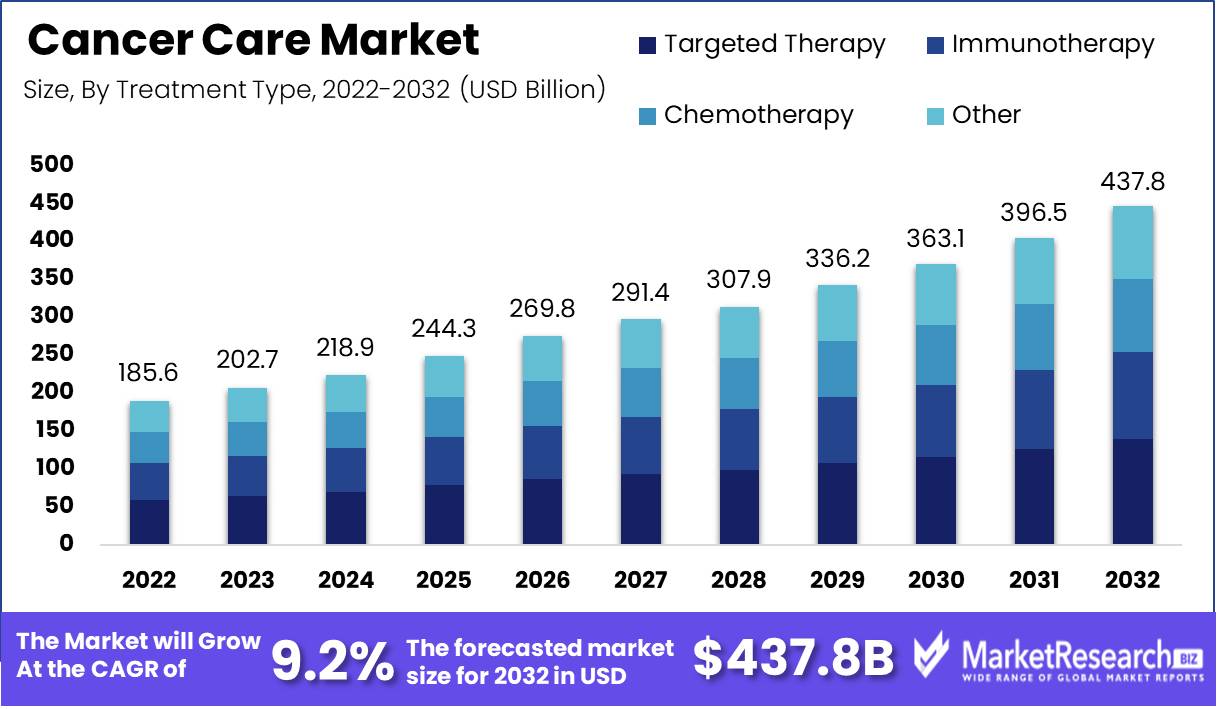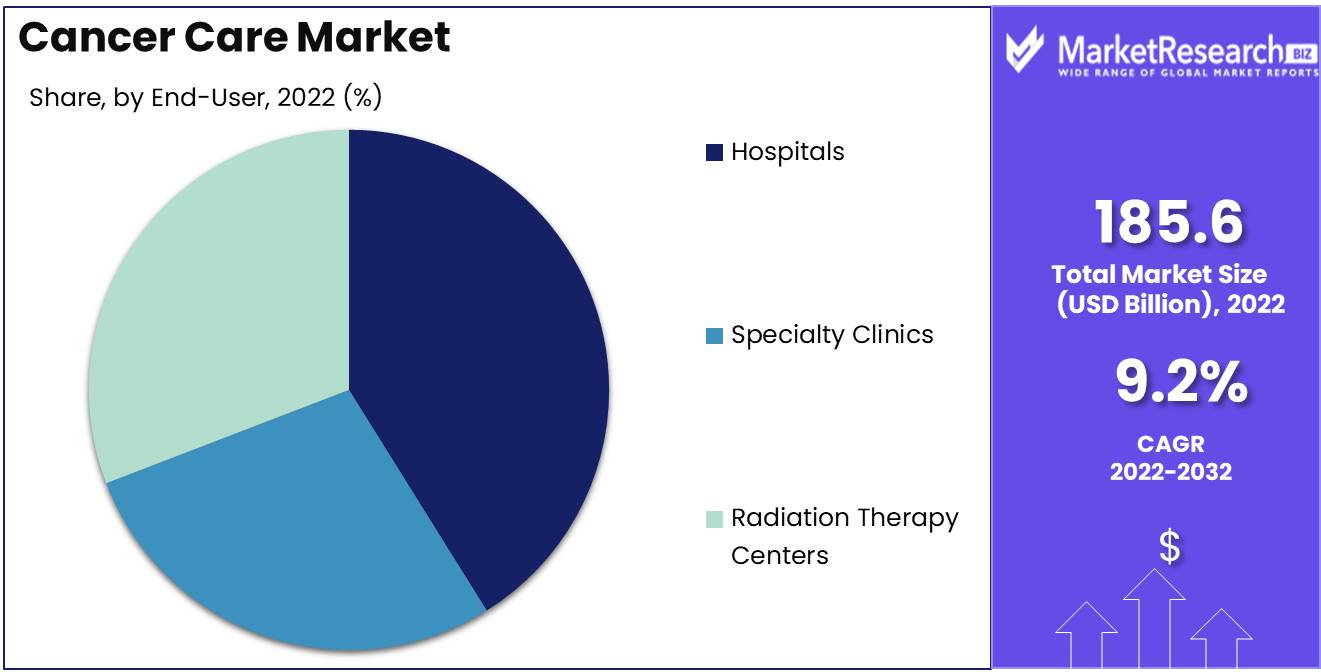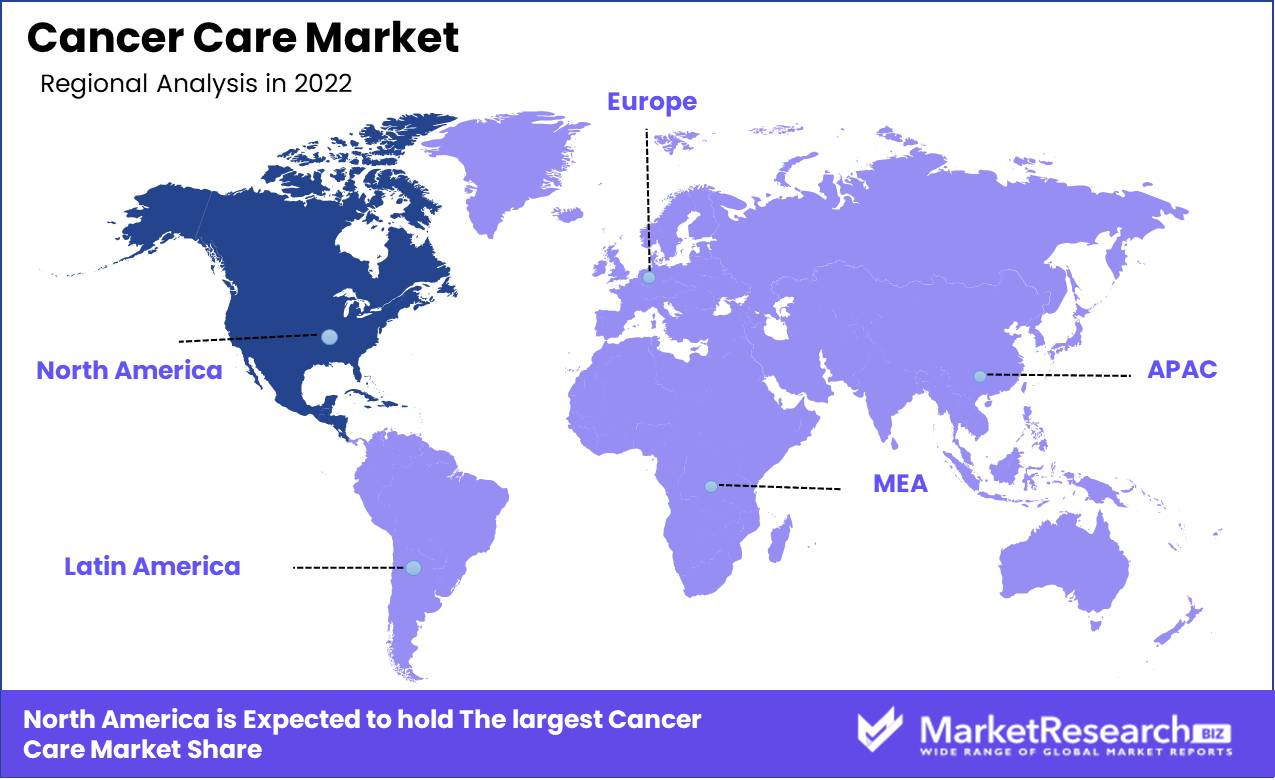
Global Cancer Care Market By Treatment Types (Targeted Therapy, Immunotherapy, Chemotherapy, Other), By Cancer Type (Breast Cancer, Blood Cancer, Other), By End-User (Hospitals, Specialty Clinics, Other), By Region And Companies - Industry Segment Outlook, Market Assessment, Competition Scenario, Trends, And Forecast 2023-2032
-
37580
-
June 2023
-
163
-
-
This report was compiled by Correspondence Linkedin | Detailed Market research Methodology Our methodology involves a mix of primary research, including interviews with leading mental health experts, and secondary research from reputable medical journals and databases. View Detailed Methodology Page
-
Quick Navigation
Report Overview
Global Cancer Care Market size is expected to be worth around USD 437.8 Bn by 2032 from USD 185.6 Bn in 2022, growing at a CAGR of 9.2% during the forecast period from 2023 to 2032.
The vast and intricate realm of the global cancer care market encompasses a multifaceted tapestry of products and services aimed at the diagnosis, treatment, and prevention of the formidable foe known as cancer. It traverses a labyrinth of medical devices, cutting-edge technologies, pharmaceutical marvels, and an array of services meticulously orchestrated to combat this affliction and bestow compassionate care upon the valiant warriors in their battle against cancer.

The advent of personalized medicine, for instance, has revolutionized the landscape by tailoring cancer treatments to the singular genetic fabric of each afflicted soul. In parallel, the resplendent dawn of immunotherapy has emerged as a beacon of hope, harnessing the wondrous power of the body's own immune system to wage a fierce battle against the nefarious cancer cells. Furthermore, a meteoric ascent toward the frontiers of digital health technologies is gaining momentum, affording patients the gift of remote monitoring, real-time analysis, and bespoke care, all within the comforting embrace of modern innovation.
In its quest for progress and advancement, the cancer care market has become a magnet for substantial investments from a wide array of industries, including the pharmaceutical giants, medical device virtuosos, and healthcare purveyors. The marriage between cancer care and the cutting-edge realms of artificial intelligence (AI) and machine learning (ML) is witnessing a rapturous union, empowering practitioners with enhanced diagnostic accuracy, refining treatments to unparalleled levels, and ushering in an era of cost reduction, thereby ensuring the cancer care market flourishes and thrives.
The pharmaceutical industry, with its profound expertise and inexorable commitment to healing, stands as a resolute patron of the cancer care market. These stalwarts invest their resources with unwavering determination, conceiving groundbreaking treatments and therapies that hold the promise of salvation for those embattled by cancer's relentless grasp. Similarly, medical device pioneers have ventured forth into uncharted territories, injecting copious investments into the market to forge the vanguard of advanced imaging technologies and diagnostic marvels.
Underpinning the driving forces propelling the global cancer care market forward is an amalgamation of salient factors. The inexorable rise in cancer prevalence across the globe acts as a resounding crescendo, necessitating an indomitable response from the industry. The adoption of state-of-the-art healthcare technologies resonates with the collective yearning for progress and propels the market ever closer to the pinnacle of success. Simultaneously, the insatiable hunger for personalized medicine finds resonance within the market's core, where tailored treatments are the epitome of empowerment.
Yet, the path trodden by the global cancer care market is not devoid of ethical quandaries that merit our utmost contemplation. The sanctity of patient privacy, the cornerstone of trust in the therapeutic alliance, must be preserved with unwavering tenacity. Informed consent, a beacon of autonomy, should illuminate the path forward, guiding decisions with the patient agency at its core.
Driving factors
Increased Prevalence and Treatment Innovations Position the Cancer Care Market for Significant Growth
In the upcoming years, the global cancer care market is expected to grow significantly. The increasing prevalence and incidence of cancer worldwide is a driving factor. Additionally, advances in cancer diagnostics and treatment methods have contributed to the expansion of this market, giving patients more effective and individualized care options.
The FDA's Breakthrough Devices Program Fuels Innovation and Interest in Cancer Care Around the World
Several regulatory changes may have an impact on the global market for cancer care. For instance, the FDA has recently launched the Breakthrough Devices Program to expedite the development and approval of innovative diagnostic and therapeutic products. This program is expected to increase interest in the cancer care market, particularly among companies developing novel cancer therapies.
Targeted Therapies and Data-driven Emerging Technologies Revolutionize Cancer Treatment
Emerging technologies are expected to have an impact on the cancer care market. Recent advances in genomics and precision medicine, for instance, enable scientists to develop more targeted cancer therapies. In addition, artificial intelligence and machine learning are being utilized to analyze immense quantities of cancer-related data in order to develop new insights regarding cancer prevention, diagnosis, and treatment.
Challenged by Disruptive Technologies and Changing Healthcare Models Competitive Environment of the Cancer Care Market
Companies developing disruptive technologies and treatments, as well as the emergence of new data-driven healthcare models, are potential disruptors of the global cancer care market's competitive landscape. Changes in healthcare policy and reimbursement may also have an impact on the competitive landscape of this market.
The Future of Cancer Care is Shaped by Digital Health and Patient-Centered Trends
Emerging trends and variations in consumer behavior may have an impact on the cancer care market. For instance, the growing popularity of digital health and telemedicine may have an impact on how cancer care services are delivered and ingested. As patients become more familiar with digital health tools, they may favor receiving cancer care services remotely or via online platforms.
Restraining Factors
Cancer Care Market Cost Barrier Hinders
The global cancer care market is hindered by a number of factors that prevent patients from gaining access to appropriate treatment services. These challenges are diverse, ranging from high treatment costs to limited access to cancer care services in certain regions, difficulties in implementing personalized medicine approaches, potential side effects, and toxicities associated with cancer treatments.
Cancer Care Market is Affected by Regionally Limited Access
High treatment costs are one of the primary factors limiting cancer patients worldwide. Cancer treatments are costly because they require sophisticated medical equipment and skill. Due to the exorbitant cost of cancer treatments, a significant proportion of cancer patients are unable to access them, reducing their chances of survival. This has been a significant obstacle, especially in low-income regions such as Sub-Saharan Africa and Southeast Asia, where access to appropriate cancer treatment is limited due to financial constraints.
Difficulties with Personalized Cancer Treatment
In certain regions, limited access to cancer care services is also a significant constraining factor. Certain regions lack adequate cancer treatment facilities, compelling patients to travel considerable distances to receive medical care. For instance, cancer patients in rural areas may be required to travel to urban centers to access appropriate cancer care, which can be financially burdensome and necessitate lengthy absences from home.
Side Effects Restrict Available Cancer Treatments
Globally, the implementation of personalized medicine approaches presents significant obstacles for cancer patients. Personalized medicine involves tailoring medical treatment to a patient's unique genetic and environmental characteristics. However, this approach may be hampered by limited genetics data, a lack of effective data analysis tools, and insufficient medical expertise.
Toxins Pose Obstacles in the Cancer Care Market
Potential adverse effects and toxicities of cancer treatments are also limiting factors. Cancer treatments such as chemotherapy and radiation therapy may have severe adverse effects such as fatigue, hair loss, and nausea. This factor discourages cancer patients from pursuing treatment, as it may negatively impact their quality of life.
Treatment Types Analysis
Due to its effective treatment of cancer cells, targeted therapy segments have dominated the global cancer care market. Targeted therapy is a type of cancer treatment that employs drugs or other substances to target and destroy specific cancer cells without injuring healthy cells. This segment has experienced phenomenal growth in recent years and is projected to continue its dominance in the years to come.
The economic growth of emerging economies like China, India, and Brazil is driving the adoption of the targeted therapy segment. These economies are experiencing significant growth and their purchasing power is rising, resulting in a rise in demand for advanced cancer therapies. The increase in disposable income has enabled people to spend more on health care, thereby bolstering the sales of targeted therapy drugs.
Due to its numerous advantages, consumers are increasingly choosing targeted therapy over traditional chemotherapy. Targeted therapy has fewer adverse effects and is a more tolerable treatment option for cancer patients. This has led to an increase in the demand for targeted therapy drugs, making them a popular option among cancer patients. In addition, an aging population is more susceptible to cancer, and as the global population continues to age, demand for targeted therapy is expected to skyrocket.
Due to its growing prominence among patients and healthcare providers, the targeted therapy segment is expected to register the fastest growth rate over the coming years. Targeted therapy is more accurate and effective than conventional chemotherapy, making it the treatment of choice for cancer patients.
Cancer Type Analysis
Breast cancer is the most common cancer among women worldwide, and it has dominated the global market for cancer care. Breast cancer is a cancer that develops in breast tissue and has a high mortality rate. Due to the rising incidence rate of breast cancer globally, the breast cancer segment is projected to continue to maintain its dominance in the coming years.
The economic growth of emerging economies is driving the adoption of breast cancer treatments, making this market segment the dominant one in the global cancer care industry. Increased awareness of breast cancer and its early detection has led to an increase in demand for effective breast cancer treatments.
Consumers' awareness of the potential risks of breast cancer is increasing, and as a result, more women are opting for regular exams and screenings. Targeted therapy has proven to be the most effective treatment for breast cancer due to the early detection of breast cancer, which has led to an increase in the demand for treatments.
The high demand for breast cancer treatments is primarily driven by the rising incidence of breast cancer worldwide, making it the fastest-growing segment of the global cancer care market.
End-User Analysis
In recent years, the hospital segment has dominated the global cancer care market, and it is projected that this dominance will continue in the future years. Hospitals provide the majority of cancer treatments globally, which has contributed to the segment's dominance.
Emerging economies are experiencing substantial growth, and their healthcare infrastructure is increasing, which is driving hospitals' adoption of cancer treatments. In emerging economies, the increase in government expenditure on healthcare and favorable policies promoting healthcare have contributed to the growth of the hospital segment.
Because hospitals provide comprehensive cancer care services, such as surgery, chemotherapy, and targeted therapy, consumers prefer them. In addition, hospitals have well-equipped facilities and specialized medical personnel who can provide patients with individualized care.
Due to the rising incidence of cancer globally, the hospital segment is expected to register the fastest growth rate in the future years. As more individuals are diagnosed with cancer, the demand for cancer treatments in hospitals is expected to rise.

Key Market Segments
By Treatment Types
- Targeted Therapy
- Immunotherapy
- Chemotherapy
- Other Treatment Types
By Cancer Type
- Breast Cancer
- Blood Cancer
- Prostate Cancer
- Lung Cancer
- Other Cancer Types
By End-User
- Hospitals
- Specialty Clinics
- Radiation Therapy Centers
Growth Opportunity
Innovative Therapies Drive the Expanding Cancer Care Market
We are observing a growth potential in the global cancer care market, which is fuelled by a number of factors. Among these are the development of targeted therapies and immunotherapies, the expansion of comprehensive cancer care facilities, the integration of precision medicine and genomic profiling into cancer treatment, and the increased collaboration between oncologists and research institutions.
Facilities Expansion Boosts the Global Cancer Care Market
The development of targeted therapies and immunotherapies represents a significant advancement in the treatment of cancer. Immunotherapies harness the force of the patient's immune system to combat cancer, whereas targeted therapies target particular genes or proteins in cancer cells. In clinical trials, these therapies have demonstrated promising results, and they are becoming increasingly accessible to cancer patients worldwide
Cancer Treatment Is Revolutionized by Precision Medicine
The growth of comprehensive cancer care facilities is also contributing to the expansion of the global cancer care market. Comprehensive cancer care facilities provide a variety of services, such as prevention, screening, diagnosis, treatment, and supportive care. These facilities provide a multidisciplinary approach to cancer care, in which oncologists and other specialists collaborate to provide the best care possible for the patient.
Cooperation Drives the Global Cancer Care Market
As cancer incidence rates continue to rise worldwide, there is a growing demand for comprehensive cancer care facilities. In response to this increasing demand, healthcare providers are investing in the expansion of their cancer care facilities, which is propelling the growth of the global cancer care market.
Immunotherapies & Targeted Therapies Transform Cancer Care
Precision medicine and genomic profiling are becoming essential cancer treatment tools. Precision medicine is the use of genetic information to tailor treatment to individual patients, whereas genomic profiling is the analysis of a patient's genetic composition to identify cancer-causing mutations. Based on a patient's unique genetic and molecular profile, these methods can assist oncologists in identifying the most effective treatment for that patient.
Latest Trends
Precision Oncology is Driving the Expansion of the Cancer Care Market
The global cancer care market has experienced significant growth in recent years, propelled by a number of key market trends. Together, the world's aging population and rising cancer incidence rates have increased the demand for innovative cancer care therapies. With a growing emphasis on the use of precision oncology for treatment selection, oncology treatment has become more individualized and precise.
Minimally Invasive Cancer Surgery on the Rise
The adoption of minimally invasive and robotic-assisted surgeries is a significant trend that is reshaping the global cancer care market. These sophisticated surgical techniques provide more precise and less invasive treatment, resulting in lower morbidity rates, shorter hospital stays, and quicker recoveries. Using robotic-assisted surgery, surgeons can perform intricate, complex procedures with greater precision than with conventional techniques, thereby enhancing patient outcomes and reducing complications.
Focus on Services of Supportive Care for Cancer Patients
The focus on supportive care services for cancer patients is another trend. In addition to cancer treatment, the holistic approach to cancer care includes assistance with symptom management, psychological support, and palliative care. By addressing the emotional, social, and spiritual aspects of a patient's treatment journey, purveyors of supportive care enhance the quality of life of their patients.
Telemedicine Revolutionizes the Treatment of Cancer
Integrating telemedicine and digital health solutions into the delivery of cancer care is yet another trend that is shaping the Cancer Care Market. Oncology makes use of telemedicine solutions such as remote electronic consultation, telemonitoring, and telepathology. Mobile health apps, wearable devices, and electronic medical records facilitate coordination in the administration of cancer care and offer patient-centered, timely care.
Regional Analysis
Cancer care is a thriving industry in North America, where innovative technologies and advanced research have increased access to life-saving treatments. As the primary center for cancer research worldwide, the region has dominated the global market for cancer care.
In North America, the cancer care industry has experienced unprecedented growth, with the United States and Canada heading the way. Several factors contribute to the success of these two countries, which hold the largest market share.
A significant investment in cancer research is one of the factors for their success. The cancer care industry has always been at the vanguard of scientific research and development in North America. Each year, private companies and research institutes in the region invest millions of dollars in cancer research, driving innovation and stretching the envelope.
In addition, North American regulatory standards ensure that cancer treatments and medical devices are safe, effective, and have few adverse effects. The robust regulatory framework ensures that new treatments and technology undergo rigorous testing and evaluation and that only those that meet the highest standards are approved for use.
The availability of cutting-edge treatments, technology, and apparatus also contributes to North America's market dominance in cancer care. Modern cancer treatments, such as cancer immunotherapy, targeted therapy, and gene therapy, are widely accessible, and new technologies, such as robotic surgery and proton therapy, are acquiring popularity rapidly.

Key Regions and Countries
North America
- US
- Canada
- Mexico
Western Europe
- Germany
- France
- The UK
- Spain
- Italy
- Portugal
- Ireland
- Austria
- Switzerland
- Benelux
- Nordic
- Rest of Western Europe
Eastern Europe
- Russia
- Poland
- The Czech Republic
- Greece
- Rest of Eastern Europe
APAC
- China
- Japan
- South Korea
- India
- Australia & New Zealand
- Indonesia
- Malaysia
- Philippines
- Singapore
- Thailand
- Vietnam
- Rest of APAC
Latin America
- Brazil
- Colombia
- Chile
- Argentina
- Costa Rica
- Rest of Latin America
Middle East & Africa
- Algeria
- Egypt
- Israel
- Kuwait
- Nigeria
- Saudi Arabia
- South Africa
- Turkey
- United Arab Emirates
- Rest of MEA
Key Players Analysis
The global cancer care market is a burgeoning industry with a number of key players committed to developing novel treatments to fight this disease. Some of the most innovative technologies in the field of healthcare are being developed in this market.
Roche is one of the most significant market players, with a primary concentration on developing and marketing innovative cancer treatments, including targeted therapies, immunotherapies, and chemotherapy drugs.
Pfizer is a prominent pharmaceutical company with a portfolio of oncology medications. Oncology drugs from Pfizer are used to treat lung cancer, breast cancer, and various other forms of cancer.
The pharmaceutical company Novartis is renowned for its innovative cell and gene therapy. They are developing immunotherapies for cancer and other innovative cancer treatments.
Amgen: Amgen is a biotechnology company that is developing treatments for numerous types of cancer. Their primary objective is to develop therapies that target cancer cells and assist the immune system in fighting cancer.
Bristol-Myers Squibb is a leading pharmaceutical corporation that develops and markets a variety of cancer treatments, including immunotherapies and targeted therapies.
Top Key Players in Cancer Care Market
- Roche
- Pfizer
- Novartis AG
- Amgen
- Johnson & Johnson Services, Inc
- AbbVie Inc.
- Astellas Pharma US, Inc
- Sanofi
- Ipsen Pharma
- Bayer AG
- Teva Pharmaceutical Industries Ltd
- Bristol-Myers Squibb Company
- Abbott
- AstraZeneca
- GSK plc
- Other Key Players
Recent Development
- In 2023, Cell-based therapies, such as CAR-T cell therapy, acquired momentum. These innovative treatments, which involved modifying a patient's immune cells to target and destroy cancer cells, have demonstrated promising results in the treatment of certain forms of cancer.
- In 2022, Precision Medicine, and Targeted Therapies With a greater emphasis on identifying particular genetic mutations or alterations in malignancies, targeted therapies became more refined. This methodology allowed for more precise, patient-specific treatment decisions.
- In 2021, Immunotherapy advancements Immunotherapy research and development continued, resulting in the creation of new cancer-fighting drugs and a better understanding of the immune system's role in battling the disease.
- In 2020, Liquid biopsies gain momentum: Liquid biopsies are gaining popularity as a non-invasive method for detecting and monitoring cancer. These blood tests analyze circulating tumor DNA or other biomarkers.
- In 2019, Immunotherapy breakthroughs include: Immunotherapy has emerged as a game-changer in the treatment of cancer, with new drugs and combinations demonstrating remarkable success in enhancing the immune system's ability to combat cancer cells.
Report Scope:
Report Features Description Market Value (2022) USD 185.6 Bn Forecast Revenue (2032) USD 437.8 Bn CAGR (2023-2032) 9.2% Base Year for Estimation 2022 Historic Period 2016-2022 Forecast Period 2023-2032 Report Coverage Revenue Forecast, Market Dynamics, COVID-19 Impact, Competitive Landscape, Recent Developments Segments Covered By Treatment Types (Targeted Therapy, Immunotherapy, Chemotherapy, Other Treatment Types), By Cancer Type (Breast Cancer, Blood Cancer, Prostate Cancer, Lung Cancer, Other Cancer Types), By End-User (Hospitals, Specialty Clinics, Radiation Therapy Centers) Regional Analysis North America – The US, Canada, & Mexico; Western Europe – Germany, France, The UK, Spain, Italy, Portugal, Ireland, Austria, Switzerland, Benelux, Nordic, & Rest of Western Europe; Eastern Europe – Russia, Poland, The Czech Republic, Greece, & Rest of Eastern Europe; APAC – China, Japan, South Korea, India, Australia & New Zealand, Indonesia, Malaysia, Philippines, Singapore, Thailand, Vietnam, & Rest of APAC; Latin America – Brazil, Colombia, Chile, Argentina, Costa Rica, & Rest of Latin America; Middle East & Africa – Algeria, Egypt, Israel, Kuwait, Nigeria, Saudi Arabia, South Africa, Turkey, United Arab Emirates, & Rest of MEA Competitive Landscape Roche, Pfizer, Novartis AG, Amgen, Johnson & Johnson Services, Inc, AbbVie Inc., Astellas Pharma US, Inc, Sanofi, Ipsen Pharma, Bayer AG, Teva Pharmaceutical Industries Ltd, Bristol-Myers Squibb Company, Abbott, AstraZeneca, GSK plc, Other Key Plyers Customization Scope Customization for segments, region/country-level will be provided. Moreover, additional customization can be done based on the requirements. Purchase Options We have three licenses to opt for: Single User License, Multi-User License (Up to 5 Users), Corporate Use License (Unlimited User and Printable PDF) -
-
- Roche
- Pfizer
- Novartis AG
- Amgen
- Johnson & Johnson Services, Inc
- AbbVie Inc.
- Astellas Pharma US, Inc
- Sanofi
- Ipsen Pharma
- Bayer AG
- Teva Pharmaceutical Industries Ltd
- Bristol-Myers Squibb Company
- Abbott
- AstraZeneca
- GSK plc
- Other Key Players




